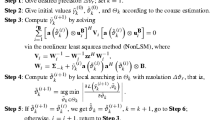Abstract
In this paper we study direction of arrival (DOA) estimation of multiple audio sources by canonical correlation analysis (CCA), which is based on a sparse linear arrays. This array is composed of two separated subarrays. From the receiving data set, we can obtain the separate components by CCA. After a simple correlation, time difference can be obtained, and then we can compute the azimuth of different audio sources. The important contribution of this new estimation method is that it can reduce the effect of inter-sensor spacing to DOA estimation and the computation burden is light. Simulation result confirms the validity and practicality of the proposed approach. Results of DOA estimation are more accurate and stable based on this new method.
Preview
Unable to display preview. Download preview PDF.
Similar content being viewed by others
References
Torkkola, K.: Blind separation of delayed sources based on information maximization. In: Proc. IEEE ICASSP, pp. 3509–3512 (1996)
Huang, G.M., Yang, L.X., He, Z.Y.: Time-Delay Direction Finding Based on Canonical Correlation Analysis. In: ISCAS 2005, Kobe, Japan, May 23-26 (2005) (accepted)
Hotelling, H.: Relations between two sets of variates. Biometrika (28), 321–377 (1936)
Anderson, T.W.: An Introduction to Multivariate Statistical Analysis, 2nd edn. John Wiley & Sons, Chichester (1984)
Zhang, R.T., Fang, K.T.: An Introduction to Multivariate Statistical Analysis. Science House (1982)
Borga, M.: Learning Multidimensional Signal Processing. PhD thesis, Linköping University, Sweden, SE-581 83 Linköping, Sweden, 1998. Dissertation No 531, ISBN 91-7219-202-X (1998)
Bach, F.R., Jordan, M.I.: Kernel independent component analysis. Journal of Machine Learning Research (3), 1–48 (2002)
Fyfe, C., Lai, P.L.: Ica using kernel canonical correlation analysis. In: ICA 2000, vol. (8), pp. 279–284 (2000)
Author information
Authors and Affiliations
Editor information
Editors and Affiliations
Rights and permissions
Copyright information
© 2005 Springer-Verlag Berlin Heidelberg
About this paper
Cite this paper
Huang, G., Yang, L., He, Z. (2005). Canonical Correlation Analysis Using for DOA Estimation of Multiple Audio Sources. In: Cabestany, J., Prieto, A., Sandoval, F. (eds) Computational Intelligence and Bioinspired Systems. IWANN 2005. Lecture Notes in Computer Science, vol 3512. Springer, Berlin, Heidelberg. https://doi.org/10.1007/11494669_105
Download citation
DOI: https://doi.org/10.1007/11494669_105
Publisher Name: Springer, Berlin, Heidelberg
Print ISBN: 978-3-540-26208-4
Online ISBN: 978-3-540-32106-4
eBook Packages: Computer ScienceComputer Science (R0)




